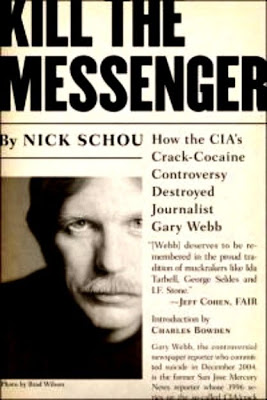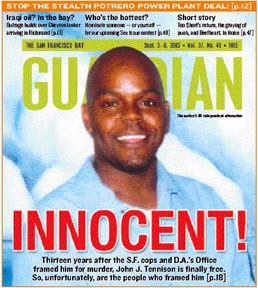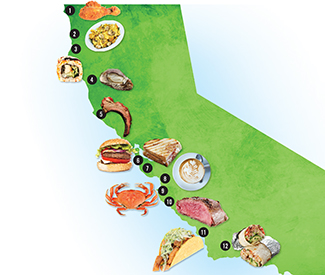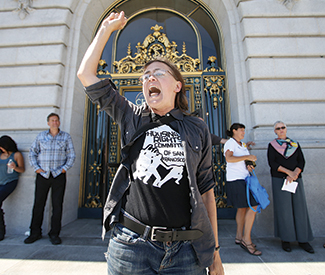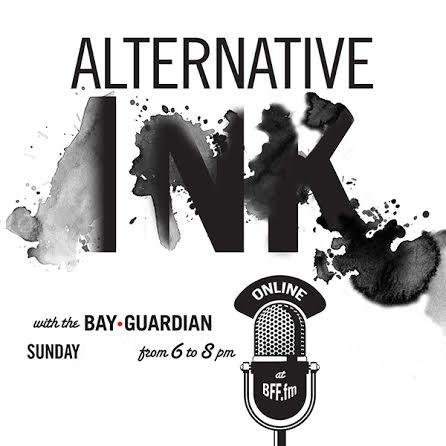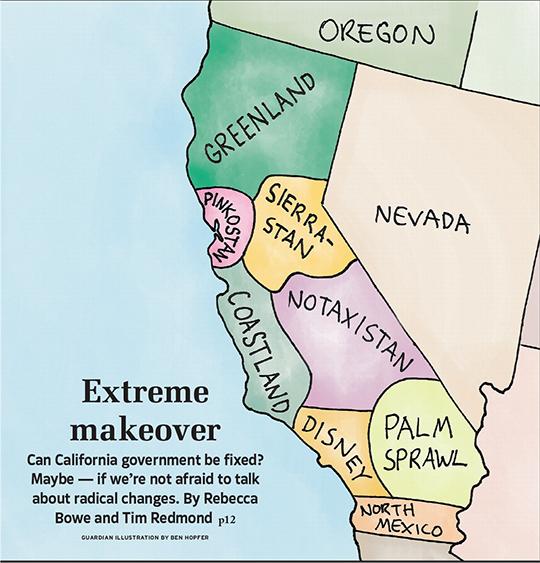Advocates for sustainable transportation and affordable housing in San Francisco — who have been pitted against each other in this election — discussed their differences and found some common ground for a post-election agenda during a community forum last night [Thu/9] hosted by the Bay Guardian and San Francisco Transit Riders Union.
We intended for the forum, “Bridging the Gaps in Funding Transit and Housing,” to begin to heal the rift that has developed over the last couple years and played out strongly this year in the creation of and campaigns for Propositions A, B, G, K, and L, with each camp not supporting the other’s priorities.
But there was broad agreement that both sides should work together on an affordabilty agenda that combats rising housing and transportation costs, the need to incorporate equity and social justice studies into the solutions this coalition should pursue, and even some specific funding mechanisms to meet both needs, including charging transportation impact fees to residential developers and uniting in a campaign to increase the local vehicle license fee in 2016.
“If you looking at what kind of city this is going to be, it really is about housing and transportation. They are two sides of the same coin,” Sup. Scott Wiener said after he arrived late in the forum, explaining how he has filled a critical void in transportation advocacy at City Hall. “The problem has been that over time, everytime there’s a budget fight, Muni loses.”
But Wiener has been a political lightning rod, particularly with renters and affordable housing activists who blame him for the division and for moving forward with Prop. B, which increases funding for Muni, without building a broader coalition first.
“I think the VLF could have had a chance [this year], but what it was lacking was a solid coalition to pull it off,” Peter Cohen, co-director of the Council of Community Housing Organizations, said at the forum.
Cohen and his allies were left out of the Mayor’s 2013 Transportation Task Force, and they were critical of it for setting priorities and identifying funding options before undertaking a broad study of equity and social justice considerations, a study that the SFMTA is now working on with support from transportation activists.
Cohen didn’t accept the framing that helping Muni necessarily helps low-income households — 53 percent of Muni riders don’t have access to a car and 51 percent live in low-income households, according to an SFMTA ridership survey presented at the forum by the agency’s Jonathan Rewers — saying many system improvements are aimed at wealthier parts of town.
“The question is what parts of the system are actually being improved,” Cohen said, adding, “When you get down to the fine grain scale, it’s a lot more complicated.”
But Wiener and transit activists didn’t agree, noting that most Muni lines connect rich and poor neighborhoods, and that when you consider that low-income people disproportionately ride public transit, giving money to Muni necessarily helps the poor.
“There are very few [Muni] lines that only serve low-income people or high-income people,” Wiener said, arguing the public transit funding helps the entire city, and disproportionately the low-income people who rely on Muni.
“Helping Muni intrinsically helps low-income folks,” Amandeep Jawa, president of the League of Conservation Voters, said. “Fixing Muni is intrinsically a equity issue.”
That was also how SFTRU’s Thea Selby framed the issue: “We have a customer base that is low income and we have to take that into account.”
But because affordable housing and the transportation system each have funding needs running into the billions of dollars, there is tension.
“It’s a limited pile of funds, so we all feel like we’re fighting in a zero sum game,” Jawa said, blaming elected officials for unnecessarily creating that divisive paradigm and failing to identify new funding sources. “There is a lack of political leadership in this town, and not on the activist side.”
But when Jawa made an exception of Wiener (who hadn’t yet arrived at the forum), praising Wiener’s leadership on transportation issues, Cohen reacted angrily and blamed Wiener for sowing the divisions between transportation and housing activists.
“We see very intentional wedging,” Cohen said, criticizing Wiener for placing Prop. B on the ballot (which Cohen and his group opposes) and for opposing Prop. G, the anti-speculation tax that is a top priority for affordable housing advocates this election. “We have had a very difficult time working together because we have been pitted against each other.”
Yet Jawa criticized how Cohen and affordable housing activists have tried to frame the discussion around Prop. B, which increases General Fund contributions to Muni as the city’s population increases: “I don’t believe the notion that we’re stealing from affordable housing. We’re not.”
Eventually, those tense moments in which the divisions were sharply on display yielded to more civility and pledges to work together after this election.
“From my perspective, we need to not be at each other’s throats, but we have to work at all those priorities,” said Peter Strauss of the SFTRU.
“Talking, we can begin to understand each other’s priorities,” said Chema Hernández Gil of the San Francisco Bicycle Coalition, pledging to work with Cohen and other affordable housing and social justice activists to strength that coalition.
Hernández Gil cited studies showing that housing is the biggest expenditure for San Franciscans, followed by transportation costs. A worker making minimum wage pay about half of his or her income on housing and a quarter on transportation, leaving very little left for other expenses.
“If you need a car, how much it costs to live here gets so much more expensive,” Jawa said, citing the importance of transit-first policies to an affordability agenda. So he said the pro-car Prop. L would make San Francisco more expensive. “Prop. L is all about transportation affordability in the end,” Jawa said, urging voters to reject the measure.
Cohen noted that he’s supporting the Prop. A general obligation transportation bond and will continue to supporting the creation of a sustainable transportation system as well.
“Right now, residential development doesn’t pay a nickel for transportation infrastructure,” Cohen said, with his call for a residential transportation impact fee winning support from most of the activists in the room.
Cohen asked the transportation activists for their support on housing issues.
“What we have in San Francisco is a dramatic shortage of affordable housing,” Cohen said, calling for a broad coalition to support more public funding to build affordable housing. “It’s going to take a lot of work and a lot you coming back to support funding measures on the ballot.”


